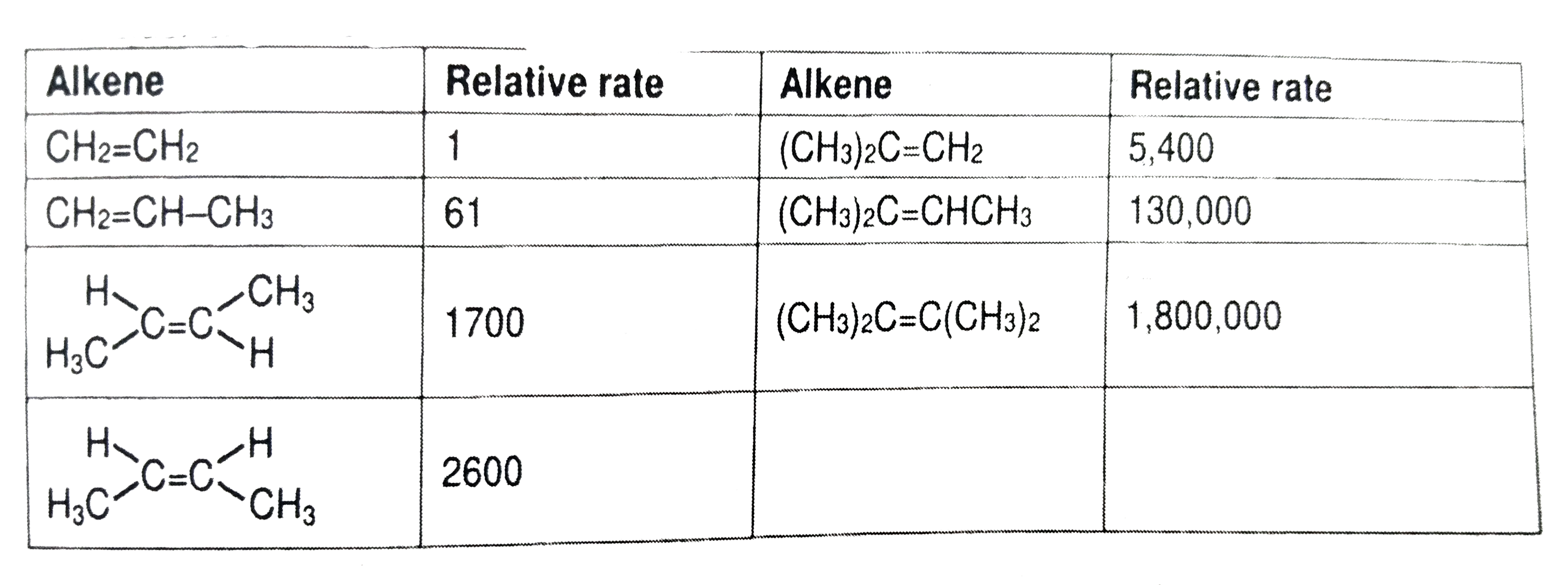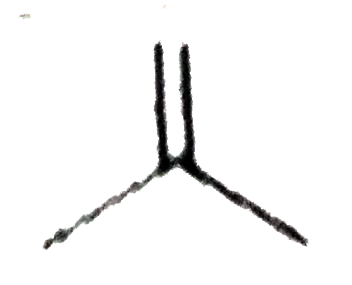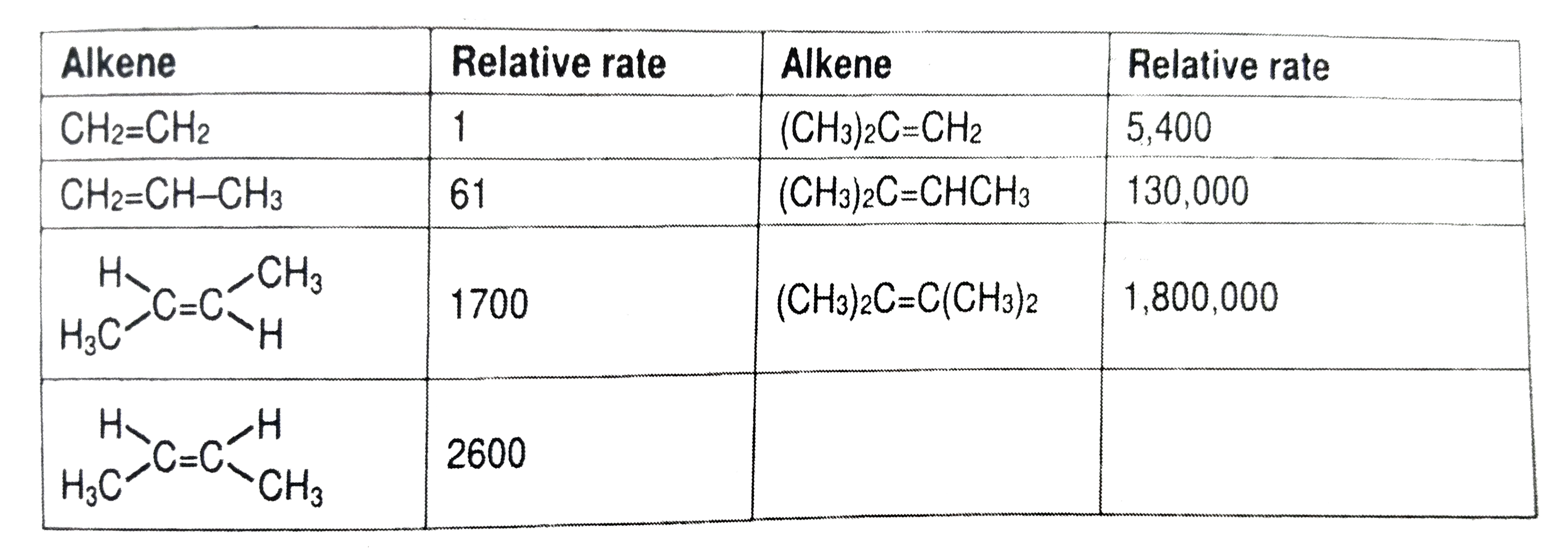Consider experimental data shown in the table :

Rate of electrophilic addition on isobutylene is significantly higher than cis or trans-2-Butene chiefly due to -


Better stabilization of positive charge acquired during formation of bromonium ion intermediate by Me-groups.
High angle strain in the molecule.
The correct Answer is:C
Topper's Solved these Questions
- ORGANIC REACTION MECHANISMS - IIBOOK - RESONANCECHAPTER - ORGANIC REACTION MECHANISMS - IIEXERCISE - APSP Part - 2
43 Videos
- MOLE CONCEPTBOOK - RESONANCECHAPTER - MOLE CONCEPTEXERCISE - PHYSICAL CHEMISTRY(STOICHIOMETRY)
51 Videos
- ORGANIC REACTION MECHANISMS-IVBOOK - RESONANCECHAPTER - ORGANIC REACTION MECHANISMS-IVEXERCISE - APSP PART-3
22 Videos
Similar Questions
Consider experimental data shown in the table :

Which of the following would be expected to have highest rate of electrophilic addition of Br2 ?
View SolutionAssertion:- Boiling point of cis-2-butene is more than trans-2-butene.
Reason:- Dipole moment of cis-2-butene is more than
trans-2-butene.
View Solution
Knowledge Check
Consider experimental data shown in the table :

Which of the following would be expected to have highest rate of electrophilic addition of Br2 ?APh−CH=CH2B CPh−CH=CH−CH3DAll reacts with the same rate, since the rate depends only on [Br2] and not on the substrate.
CPh−CH=CH−CH3DAll reacts with the same rate, since the rate depends only on [Br2] and not on the substrate.Super capacitor: Super capacitor is a high capacity capacitor with a capacitance value much higher than normal capacitors but with lower voltage limits. Such capacitors bridges the gap between electrolytic capacitors and rechargeable batteries.
In automobile, bus, train, crane, elevator such capacitors are used for regenerative braking, short term energy storage or burst-mode power delivery.
Super capacitors have many advantages over batteries: they are very low weight and generally don't contain harmful chemicals or toxic metal. They can be charged and discharged innumerable number of times without ever wearing out.
The disadvantage is that super capacitors aren't well-suited for long-term energy storage. The discharge rate of super capacitors is significantly higher than lithium-ion batteries, they can lose as much 10-20% of their charge per day due to self-discharge.
Self-discharge rate of Super capacitors:A10-20% of their charge per dayB1-2% of their charge per dayC0% of their charge per dayD100% of their charge per daySuper capacitor: Super capacitor is a high capacity capacitor with a capacitance value much higher than normal capacitors but with lower voltage limits. Such capacitors bridges the gap between electrolytic capacitors and rechargeable batteries.
In automobile, bus, train, crane, elevator such capacitors are used for regenerative braking, short term energy storage or burst-mode power delivery.
Super capacitors have many advantages over batteries: they are very low weight and generally don't contain harmful chemicals or toxic metal. They can be charged and discharged innumerable number of times without ever wearing out.
The disadvantage is that super capacitors aren't well-suited for long-term energy storage. The discharge rate of super capacitors is significantly higher than lithium-ion batteries, they can lose as much 10-20% of their charge per day due to self-discharge.
Super capacitor makes a bridge between:Aelectrolytic capacitor and rechargeble batteryBsingle use battery and electrolytic capacitorCelectrolytic capacitor and dynamoDelectrolytic and non-electrolytic capacitors
Super capacitor: Super capacitor is a high capacity capacitor with a capacitance value much higher than normal capacitors but with lower voltage limits. Such capacitors bridges the gap between electrolytic capacitors and rechargeable batteries.
In automobile, bus, train, crane, elevator such capacitors are used for regenerative braking, short term energy storage or burst-mode power delivery.
Super capacitors have many advantages over batteries: they are very low weight and generally don't contain harmful chemicals or toxic metal. They can be charged and discharged innumerable number of times without ever wearing out.
The disadvantage is that super capacitors aren't well-suited for long-term energy storage. The discharge rate of super capacitors is significantly higher than lithium-ion batteries, they can lose as much 10-20% of their charge per day due to self-discharge.
Super capacitors can be charged and discharged
View SolutionSuper capacitor: Super capacitor is a high capacity capacitor with a capacitance value much higher than normal capacitors but with lower voltage limits. Such capacitors bridges the gap between electrolytic capacitors and rechargeable batteries.
In automobile, bus, train, crane, elevator such capacitors are used for regenerative braking, short term energy storage or burst-mode power delivery.
Super capacitors have many advantages over batteries: they are very low weight and generally don't contain harmful chemicals or toxic metal. They can be charged and discharged innumerable number of times without ever wearing out.
The disadvantage is that super capacitors aren't well-suited for long-term energy storage. The discharge rate of super capacitors is significantly higher than lithium-ion batteries, they can lose as much 10-20% of their charge per day due to self-discharge.
Capacity of super capacitor is:
View SolutionSuper capacitor: Super capacitor is a high capacity capacitor with a capacitance value much higher than normal capacitors but with lower voltage limits. Such capacitors bridges the gap between electrolytic capacitors and rechargeable batteries.
In automobile, bus, train, crane, elevator such capacitors are used for regenerative braking, short term energy storage or burst-mode power delivery.
Super capacitors have many advantages over batteries: they are very low weight and generally don't contain harmful chemicals or toxic metal. They can be charged and discharged innumerable number of times without ever wearing out.
The disadvantage is that super capacitors aren't well-suited for long-term energy storage. The discharge rate of super capacitors is significantly higher than lithium-ion batteries, they can lose as much 10-20% of their charge per day due to self-discharge.
Super capacitors are used for
View SolutionAromatic hydrocarbons are highly unsaturated molecules but behave like saturated hydrocarbons. Those which contain a benzene ring are called benzenoids but those which contain some highly unsaturated ring other than benzene are called non-benzenoids. Their aromatic character can be ascertained through Hückel rule. Aromatic hydrocarbons are, however, more reactive than alkanes but are less reactive than alkenes and alkynes. The lower reactivity of arenes is because of the extra stability associated with these molecules due to delocalization of -electrons. Their stability is measured in terms of resonance energy which can be estimated from either heat of combustion or heat of hydrogenation data. They normally undergo electrophilic substitution reactions. In presence of a Lewis acid catalyst, nuclear halogenation occurs but in absence of Lewis acid catalyst and in presence of light, halogens add to the benzene ring. If an aromatic hydrocarbon contains an alkyl side chain, then in presence of heat/light side chain halogenation occurs in preference to addition of halogens to the benzene ring. The reactivity of aromatic hydrocarbons towards electrophilic substitution reactions depends upon the electron density in the benzene ring. Electron-donating groups favour while electron-withdrawing groups retard these reactions. Orientation of electrophilic substitution reactions is governed by the nature of the substituent already present in the ring. Although aromatic hydrocarbons are resistant to oxidising agents (KMnO4,K2Cr2O7, etc.) they do undergo ozonolysis.
Reaction of benzene with excess of Cl2 in presence of light and in presence of anhydrous AlCl3 and in dark give respectively
View SolutionAssertion:- Boiling point of cis-2-butene is more than trans-2-butene.
Reason:- Dipole moment of cis-2-butene is more than trans-2-butnen.
View Solution
